#I LOVE YOU JOYFUL QUEER AWAKENINGS
Text
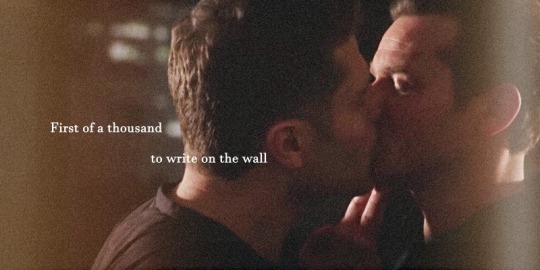
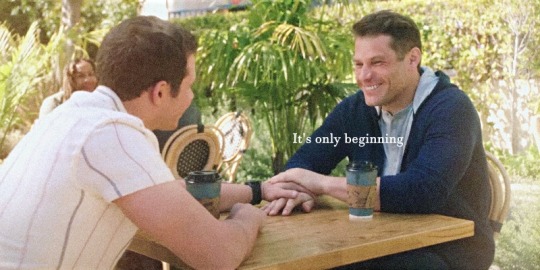
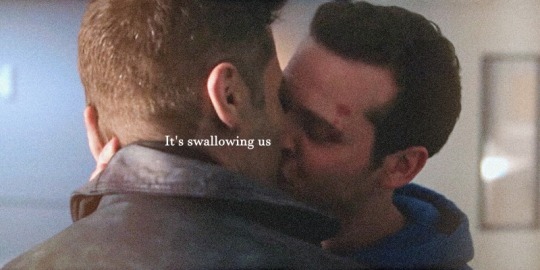
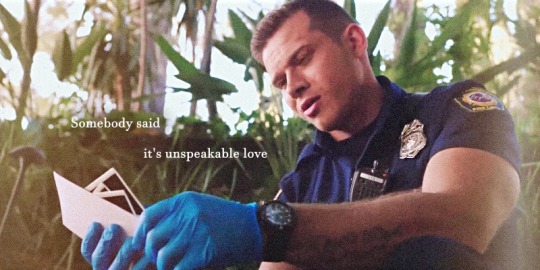
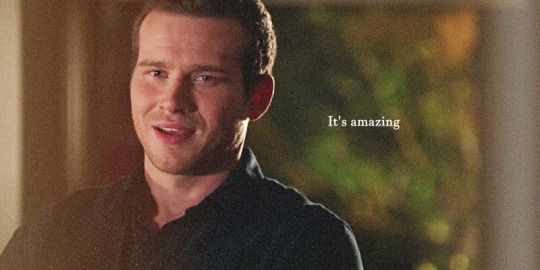
You lift that burden off of me
You lift that burden off of me
You lift that burden off of me
Manchester Orchestra, The Maze
#I LOVE YOU JOYFUL QUEER AWAKENINGS#bucktommy#tevan#evan buck buckley#tommy kinard#oliver stark#lou ferigno jr#bi buck#911#9-1-1#911 abc#edit#also!!#please note how the backgrounds look so similar on bucktommy coffee date and on buck looking at the photographs#so we have him holding the photos of a gay couple after saying he can only hope to find something that good one day#and then we have him a few years later holding his man's hand#and I hope it can be that something for him#and that together they can make it into love that will last them forever#I need to lie down again goodbye
211 notes
·
View notes
Note
Hello!! :D
Just popping in to say ILYSM (in that strange, mutuals on the internet sorta way) and that you have lots of fans who love your Halsin-posting. Your post notifications always brighten my day. ❤️
Idk why in the world you’ve got people investing their finite existence on this good Earth giving you grief. Some of your stuff might not be everyone’s cup of tea (pleasing everyone is an impossibility, after all), but it doesn’t even come close to the kinds of things my favourite hardcore/“problematic” (<= self-described, including the quotations, lmao!) Halsin/bg3 writers and artists post. And I don’t see anyone clutching their pearls in their comment sections.
Like, when I click on the profile of one of my favourite writers (which includes you! 🥰 But not this example, I love all your stuff!) and see that they’ve posted a story with a description like: “hardcore kinky stuff that you’re not into, Dead Dove: Do Not Eat”, I simply keep scrolling and maybe pick one of the hundreds to thousands of other bg3 stories I could choose from. But maybe that’s just me. ¯\_(ツ)_/¯
(Ao3 has tag filtering, you guys, it’s amazing. Remember the fucking Dark Ages when Ao3 didn’t have that at all? How tf did we ever live like that? That’s the kind of shit you say Thanks for at family Thanksgiving. And don’t tell you guys haven’t figured out at least one of the dozens of ways to filter stuff out on godsdamn Tumblr of all places; we’ve been tweaking the etiquette of that for years!)
How utterly irrational it is for these people to look at such an openly Queer and Kinky video game — the likes of which I’ve never seen in the mainstream before (He-llo strategically advantageous BDSM scene! 🤤) — and decide that they’re going to go around policing how people iterate upon those pre-established themes. How did this fandom attract puritans of all people? [Insert “The Myth of ‘Consensual’ Sex” meme here.]
Any-hoosies, all this to say that your haters are a weird, vocal minority that are letting you live rent free in their heads, instead of doing something meaningful or joyful with their pathetic, puritanical existences. There are way more people who love the kind of meta and fics that you post.
Have a good day!! XOXO 🥰😘💋💖💛🫶🤙
Hello! Thank you so much- that means a lot to me. It's weird to think of myself having "fans" lol! Like you're not the first person to use that word but it's just. Such a weird (in a good way) concept for me???? Like!?!?!? But I'm so glad to hear you love my posts <3
Yeah, pleasing everyone is impossible, and it's weird that of all things, my extremely mild CNC kink fic has become the antis' boogeyman. Fam there is literal necrophilia kink in this fandom! (Not saying they deserve to be harassed either, of course, no one should be!) But the fic that has become the pinnacle of what's problematic in this fandom is a survivor writing about a fictional survivor using kink to reclaim their sexuality? Like. OK Jan
See, but that's the difference, you're a grown adult who takes responsibility for curating your experience, whereas others.... either don't, or they don't read it but act like the fic EXISTING is a problem. I guess some people are in for a rude awakening when they discover who the Marquis de Sade is......
God, remember BEFORE AO3? Remember FFN when half the time, the PAIRING wasn't even properly tagged bc you could only tag two characters at all, so people would by default just tag the most popular characters to appear in the story? And instead of tags, you had genres, so you had to decide if you wanted romance/hurt/comfort or friendship/tragedy or what? (I'm a certified Fandom Old- on my old account I was in the first 10,000 users on AO3).
Yeah, people really are missing the point of this game- and it's no coincidence most of these folks are younger. (And a lot are exclus too; I've seen them get angry at the BG3 characters being canonically pan, saying that "pansexuality is a made-up Tumblr sexuality). So... totally blind to the interwoven history of queerness and kink. Not surprising.
Thank you so much for this kind message, anon, you cheered me up a lot. <3 I hope you have a great day!
17 notes
·
View notes
Text

HP Rec Fest, Day 30
Here we come with more @hprecfest! Today I’m only reccing rare pairs since I couldn’t think of any pre-canon Drarry fics 🤔 I wonder if canon divergent / canon rewrite applies?? I don’t read them often either way, so I figured this would be a good opportunity to boost lesser known fics. I think this is my favorite rec post for the fest so far - there’s something so poetic in reccing these two specific fics alongside each other since Little Compton Street verse was my first (unforgettable, devastating) contact with Prongsfoot and 5 years later here I am reading them again - this time welcoming the pain. More embarrassing emosh blabbing below!
Day 30) a pre-canon fic:
empire builders by shecrows (James/Sirius, E, 25k)
Say, James, he rehearses in his head. Remember that time we were both roaring drunk at the end of term, and you put your cock in my mouth, and I came so hard I still get tingly thinking about it? Was that just a one off, d’you think, or did you want to do it again sometime?
Prongsfoot my beloved 😭😭😭 sometimes I feel like I’ll never feel as strongly about a ship as I feel for them which sounds so crazy because I don’t even read it! or, well. after being utterly ruined by Winter of ‘79 (curiously a fic within LCS verse as mentioned below) I promised myself I wouldn’t look for this ship anymore bc the inevitable tragedy of it depressed me way too much. I locked them away in a secret space deep within my heart and only allowed myself to re-awaken those feelings this year, with the brilliant empire builders. what a fic! a few lines in and I was hooked and completely obsessed with Sirius’ unbelievably spot on voice, the peak friends to lovers dynamics, and the unbearable sexual tension mixing guilt and devotion (my favorite shippy combo btw). fuck, they are so young and so lovable, and so attuned to each other it makes me wanna cry. never before a 25k fic has felt so short, I’ve read it in a frenzy and couldn’t stop thinking about their love for days. the best word to describe my state after this fic is “tormented” which might as well be the best compliment I’ve ever given in a rec.
Play Me Like A Love Song by @writcraft (Minerva/Will, E, 67k)
Minerva McGonagall doesn’t believe in love at first sight, which is why her instant attraction to drag king Wilhelmina ("Will") Grubbly-Plank is so unexpected. War tears apart the wizarding world and as one battle ends Minerva and Will must fight once more, this time for the lives of their friends on Little Compton Street. A love story spanning five decades defined by music, laughter and tears, in which love is not always easy, but it’s always worth fighting for.
truly a masterpiece of lesbian fiction, this fic is more like a religious experience, bold, brutally honest, romantic, eye-opening and necessary. I never thought I’d care so much for a ship like Will & Minerva but they worked their way inside my heart and I’m deeply moved by how their story encompasses everything that’s inherent to the queer experience: love, loss, resistance and hope. there’s so much joy and grief walking hand by hand, and it is our privilege to watch the characters mature and experience life as individuals and as a couple. Writ crafts oh so thoughtfully two stunning character studies (Minerva’s voice omg, please don’t @ me on my competence kink) while taking us by the hand into the magical universe of Little Compton Street, which is so completely irresistible and healing. I adore the atmosphere, the imagery, the soundtrack, and how this seductive setting allows them to explore their queerness in such a free, proud and joyful way *getting emosh* I feel like nothing I add here will make this story justice, it’s such a poignant and transformative fic but sadly deeply underrated like it happens to so many wlw tales. I hope this rec inspires at least one person to check it out and while at it please also check the entire series with a Drarry piece and a Prongsfoot piece, a perfect trifecta!
21 notes
·
View notes
Text
I’ve been looking for other media that will resonate like ofmd does for me
I was thinking about what other media has hit me in such personal specific ways as ofmd. So maybe I can crack the code and find even more???
Predictably I’m not having a lot of luck but I DID come up with 1 example: Severance on apple tv.
If you haven’t watched both shows, it may seem like an odd pairing, because OFMD is (mostly) a comedy (wth dramatic bits) and Severance is (mostly) a drama/thriller (with comedic bits). But what can I say my brain sparked to them both in a similar way! And I think there are reasons.
~ the mildest spoilers for seasons 1 of severance and ofmd ~
Both shows have:
10/10 ensemble comedy gold. Original, weird, character-based, funny joke-ass jokes and flawless comedic performances and amazing riffing. (OK so OFMD is a comedy and has much more of this? But even though Severance is NOT a comedy, its comic relief pops up in every ep and is extremely well done.)
a similar … editorial lushness? That thing of, every frame has something juicy to notice, fun little details, little nuances in facial expressions, inside jokes, meaningful uses of color or light or whatever. Also maybe: that thing where every scene is tightly edited to be ~just the good parts~ so by the end of the ep you’re like, that was v satisfying but also I need to apply another coat of it to my consciousness immediately because I’m sure I missed something.
awakenings. ok this is going to be a nebulous half-baked description but. There is this similar theme of characters unmasking / awakening / discovering and trusting themselves / going for things that society doesn’t expect for them. This thing of realizing the truth is within. IMO this is such a healing and important trope and I want to see so much more of it. You could argue this is more blatant in the pirate show? but I think it’s an important part of severance too.
By the way! Those first two bullets just make these things “good,” and plenty of things are good. I think it’s the third one that really makes the difference.
A few more thoughts:
If you are a pirates fan but haven’t seen Severance:
You would like these goofballs riffing in their cubicles for sure.
If you love Black Pete, you will love Dylan.
A character writes a self-help book you will like a lot.
There’s a tooth-achingly sweet gentle delicate romance tucked away within this fairly dark show and it is SO GOOD.
Severance is a lot darker than ofmd but idk, there’s enough sunshine streaming in. it’s joyful too.
If you are a severance fan but haven’t seen Our Flag Means Death:
Underdogs. Underdogs who are pirates. Because lawful society does not welcome them. And they find their chosen family and. Sorry I need to cry I’ll brb.
If you love Ricken (and even if you don’t) (but who doesn’t?????), you will also love Stede.
If you love The You You Are, you will love talking it through as a crew.
If you love the plant room, you will love this one little well cared for plant?
If you love queer romance watch this show.
In summary my brain liked these things a similar amount thank you for coming to my seminar.
#more examples pls i need more things#more weirdos loving weirdos#more neurodiverse self acceptance#more first romance#more queer romance#more triumphantly linking arms with your besties and wreaking havoc#seeking out books tv anything#i mean i guess i need to watch good omens 2 that seems obvious?#severance#ofmd#our flag means death#questing for media#look i fell harder for the pirates#but i also fell HARD for MDR & O&D ok
11 notes
·
View notes
Text
Acts of Love: Teacher of the Year
I just finished Teacher of the Year by MA Wardell. I have thoughts...
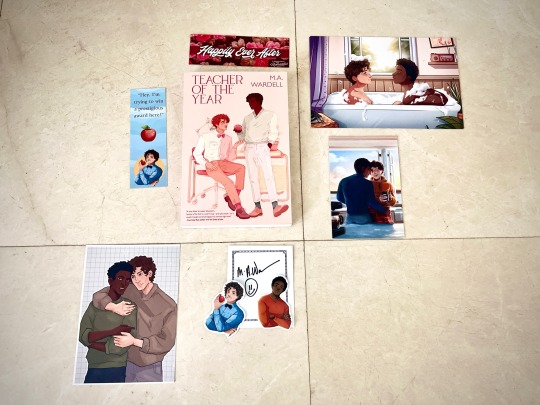
Here there be spoilers!
Representation is a word that’s used so often I fear it’s almost lost meaning. We nod along and agree that it’s important to have in theory. But until you find that book that hits you where you live...the one that makes you feel it...Can you really understand?
I never thought I loved romance novels until I started reading queer ones. I never knew how much I needed one about a teacher until I read this one.
MA Wardell’s debut Teacher of the Year has been described as a love letter to educators, but there’s something so impersonal about that. Of course teachers should be respected and celebrated for what we do! It’s rewarding work, it’s fun work, but it’s also incredibly hard work. By the same token, I think it’s become all too easy for people to reduce ‘teacher’ to yet another label. We’re either great evil or pure as the driven. We’re either entitled or exploited.
How about this: We’re human.
It’s a concept that seems obvious on its face, but I assure you that we are expected not to be. We are expected to be Mary Poppins: Practically Perfect In Every Way.
The worst part? Who gets to define perfect? What parts of yourself will you be expected to cut away to fulfill those expectations?
That’s what I love so much about Wardell’s narrator, Marvin Block. He’s not perfect. He’s an anxious mess with ADHD who doesn’t have his ducks in a row (“they typically dance at a rave”). But he’s got the one thing that counts: he loves his kids.
At the virtual launch, Wardell laughingly shared that he wondered if it was a good idea to “put teaching tips in the sexy book.” (For the record: my vote is a hard yes. Fellow teachers need all the help they can get!) But I think the only bit of wisdom we really need is this: “Teaching is an act of love.”
I live in what we in the United States call a Deep Red state. Where I live, the LGBTQ+ community is under attack. And the government is hiding it under the disingenuous plea to Think Of The Children.
Because, apparently, my very existence in the classroom is a threat to my students.
I wear my beaded rainbow bracelets and my rainbow gem necklace as a silent act of rebellion. But I also have to bite my tongue as two students in study hall debate whether or not Alexander the Great was gay (the answer as far as I’m concerned? Yes)---Why? Because if I were to say even something as innocuous as: “while we can’t even be sure how a historical person would label, there is some evidence that he had a male partner,” I could be fired. For discussing inappropriate material with a child.
I look around my school and I don’t see a single ally poster or rainbow flag. And I’m no fool. I know exactly what that means.
So I got used to the bifurcation. The French teacher can tell her students she got married this year, but I’d better shut up if I ever get a girlfriend. It hurts, but you know--you go sort of numb. You get used to it.
And why do you get used to it?
Because you love what you do. And more than that, you love your students.
But that kind of love shouldn’t demand this kind of sacrifice, the kind that hurts you so deeply it’s like chronic pain.
And that’s why Wardell’s book is so important. Marvin Block gets to have a happy beginning, middle, and end as a teacher. Everyone from admin to fellow teachers to his students knows he’s gay. And no one questions his fitness to work with children. Because a queer identity isn’t inherently, solely sexual.
That said, Wardell also said the quiet part out loud and proud: “Teachers have sex, too!” And Marvin gets to have it all. He lands the Hot Dad, awakens Hot Dad’s latent bisexuality, and has all kinds of steamy sex from the tender to the kinky. As he should! Being a teacher doesn’t make Marvin any less human. And humans should get to have joyful, uninhibited expressions of love and sexuality with other consenting humans!!
The funniest part of the whole thing is the reminder that being a teacher can--and often does--become a part of your identity as much as being queer. Like how Marvin guides Hot Dad--Olan--through sex “Like a competent teacher” who does “my best to cheer him on with the phrases ‘just like that’ and ‘a little slower.’”
That’s really what makes this book so special: We get to see all the figurative and literal acts of love by one teacher. We see Marvin as a complete person. Imperfect? Maybe. But definitely whole.
By turns sweet, spicy, funny, and above all timely, Teacher of the Year should be required reading. School is in session, and Mr. Block is modeling the lesson.
6 notes
·
View notes
Text
Only a person who realized he/she/they are queer after 30, after having many life experiences, after being brought up in the world where nothing queer even existed, realized it only upon falling in love with a best friend, can fully understand how GRATIFYING and SATISFYING and JOYFUL it is to see what people call 'Eddie Diaz's queer awakening'.
Because Eddie is me in so many ways, even though his path is arguably much more complicated, and I don't get to see stories like this in so much beautiful detail that often, if ever.
Because so many (wonderful) queer characters somehow appear on my screen fully formed, 'have always known', and I don't have anybody to relate to, always feeling 1000 steps behind the entire queer community in terms of everything, because I am somehow 10-15 years late to the party.
Enter Eddie Diaz - wonderful, caring, selfless, repressed as h*ll in all kinds of ways, aware of what should be done for one's happiness, but never applying it to himself - and I think 'I've been waiting to see you for years'.
#Eddie Diaz's queer awakening 2021#so repressed and so relatable#Eddie Diaz#it matters when you show things like these#it matters beyond anything Buddie
242 notes
·
View notes
Video
youtube
By the mid-00s, things weren’t looking quite so great for the Pet Shop Boys, who followed up an ill-conceived album of guitar ballads with a greatest hits compilation and a retrospective documentary. But rather than throwing in the towel as some fans feared, they re-emerged with one of their most daring works yet: the icy and pointedly political Fundamental. (Full transcript below the break!)
Welcome to Passionate Reply, and welcome to Great Albums. This time around, I’m looking at one of the less discussed albums in the Pet Shop Boys catalogue, but the one that’s always been my personal favourite: Fundamental, first released in 2006.
In the early 00s, things were looking surprisingly bleak for the Pet Shop Boys, an act that we tend to think of nowadays as a sort of pop institution. In 2002, they released their first major LP of the 21st Century, entitled Release, and it was, and still is, considered by many to be among their worst efforts. With a strong emphasis on guitar-based ballads, it comes across as a deeply uncharacteristic album from them, and a sort of failed experiment with where their sound could go.
Music: “I Get Along”
In 2004, the Pet Shop Boys followed up Release with a new greatest hits compilation and a documentary looking back on their career, which spurred the fansite rumour mill to assume that after a solid twenty years, the two might finally be calling it quits. But, thankfully for us, they would return in 2006 with Fundamental, an album which felt like a cathartic course correction.
Music: “The Sodom & Gomorrah Show”
Confident and commanding, “The Sodom & Gomorrah Show” was evidently considered for release as a single, but concerns over its provocative title evidently kept it as an album track. This track is a bit like an inversion of the classic Pet Shop Boys hit, “It’s a Sin”--its narrator experiences an awakening of queer consciousness, but here, the occasion is joyful and perhaps even ecstatic, with little trace of guilt or self-doubt. “The Sodom & Gomorrah Show” is probably the most cheerful and uplifting track to be had on Fundamental, which is chiefly in a more downbeat mood, and yet at the same time, it’s not all sunshine and roses. After all, it deliberately invokes the myth of Sodom and Gomorrah, casting a shadow over this gleeful spectacle that suggests the possibility of external condemnation. Musically, it’s worth noting the contributions of producer Trevor Horn, who brings his signature orchestral bombast to this album much as he did for artists like ABC in the 20th Century--not to mention the earlier Pet Shop Boys hit “Left To My Own Devices.” In contrast to the guitar-centric palette of Release, Fundamental strikes a compelling balance between the pomposity of big string and brass sections, as well as the signature synthetic sound of the Pet Shop Boys. Another track that exemplifies this instrumental balancing act is “I’m With Stupid.”
Music: “I’m With Stupid”
“I’m With Stupid” was an actual single, the third to be released from the album, and seems to be at least as solid of a choice. If I were to compare this one to a hit from earlier in the Pet Shop Boys’ career, I’d pick “How Can You Expect To Be Taken Seriously?” from their 1990 album Behaviour, which has a similar disconcerting dissonance between a winsome, catchy pop hook and a sardonic mood with cynical and bitter lyricism. The real irony of this comparison, though, is that the whole point of “Seriously” is how pathetic it appears when pop stars attempt to make grand political statements, and “I’m With Stupid” actually *is* a grand political statement--though it may not seem that way on the surface. While its narrative can be interpreted as a standalone love story, the group’s frontman and lyricist Neil Tennant has made it clear that it’s intended as an allegory for the relationship between UK prime minister Tony Blair and US president George W. Bush, with the former bending to the latter’s political whims, and hence proclaiming, “I’m With Stupid.” The Bush and Blair angle of the song is certainly interesting to think about, but I’m not sure I think it’s really the best part of the song. Put simply, I don’t think I would enjoy it as much if it didn’t also read so well on the surface, as its own sort of dark love story.
And make no mistake--“I’m With Stupid” certainly is a love story. It’s actually one of the few overtly queer romances the Pet Shop Boys have ever written, with its narrator questioning if their partner is “Mr. Right.” Most of their lyrics have historically hidden behind an ambiguously gendered “you,” a gambit that has allowed them to appeal to mainstream audiences in ways few queer artists could dream of, but for whatever reason, “I’m With Stupid” is an exception to that pattern--perhaps simply because there’s not a convenient way to phrase this line in a gender-neutral manner. Putting it all into context, I actually think there may be a sort of unintended consequence to all of this, in that “I’m With Stupid” could be interpreted as using queerness itself as an insult, as though the suggestion of same-gender romance is included as an angle of mockery. Dismissing George Bush as “stupid” was certainly a common low blow of 00s political discourse, and put next to that, an extra scoop of playground mockery based on the ancient custom of calling anything you don’t like “gay” wouldn’t be surprising to hear--though, again, this is obviously entirely unintentional. Overall, Fundamental is by far the most political work the Pet Shop Boys have made to this day. Take, for instance, “Integral.”
Music: “Integral”
Released as the album’s final single, “Integral” was promoted with a music video that prominently featured QR codes, and a large QR code served as the only adornment of the album’s physical single release. While they’re pretty common nowadays, this was actually the first time in my life I can remember ever seeing one, and it certainly had a whiff of the futuristic at the time, even before we knew that this particular prediction would come true. Likewise, the track itself remains a highlight, closing out the album with perhaps its most intense musical moment. “Integral” is anthemic and grandiose, spoken from the mouthpiece of some future authoritarian state. But it’s not necessarily a declaration of their current power, so much as it is the state persuading the listener to submit to their will--it frames the terror of dystopia as something that we need to be worried about now, lest we bring it about through our own action or inaction. Now that Bush and Blair have been out of office for many years, the more overt references to high politics in “I’m With Stupid” might seem a bit outdated, but the do-or-die urgency of “Integral”’s call to resistance is as relevant now as it was in 2006. Another track that I think has transcended its own era is “Luna Park.”
Music: “Luna Park”
While I’ve focused on some of the flashier numbers so far, *Fundamental* shines just as well when it comes to these slower-paced tracks as well. “Luna Park,” much like the album’s lead single “Numb,” is all about the desire to retreat from the problems in the world, tuning out or escaping from the stress of knowledge--a temptation that only grows greater as the 24-hour news cycle and awareness of global-scale problems encroaches upon our daily lives more and more. Much like the lotus-eaters of Greek myth, the inhabitants of Luna Park are distracted by pleasures and diversions, though the lyrics also imply that their ignorance cannot protect them forever. While “luna park” is sometimes used as a generic term for amusement parks, the original park by that name opened in 1903, and it helps give the song a bit of an “old-timey” flair, as though the residents are perhaps trying to retreat to a perceived simpler time in the past--another motif that reverberates in contemporary culture as well.
The unassuming and minimalistic cover of Fundamental is almost entirely black, with a diminutive presence of the band members as their faces look out into the void. It recalls the cover of their very first album, 1986’s Please, on which a claustrophobically cropped image of the pair is centered in a stark sea of white. But here, they gaze out from the side--no longer the center of the pop landscape, but rather aged and cynical bystanders. The world around them has shifted from the innocence and purity of white to the abyssal pessimism suggested instead by black, the colour of death and mourning in the West. The only source of light in the image comes from neon signs that spell out the names of group and album in the other corner; the only light of hope in this landscape is the harsh and artificial light of neon.
Given the political undercurrents of the album, it’s easy to interpret the title of “Fundamental” as a reference to the “fundamentalist” ideologies making waves in the world at the time. It’s also been interpreted as a suggestion that the album’s contents are “fundamental Pet Shop Boys,” a sort of roots-check for the band after the poorly-received wanderings of Release. I’m not sure I could agree that the album’s sound represents their “fundamental” core, however--surely the tinny drum machines of Please at its most low-budget, down-and-out moments reflect that more than the often ostentatious flair provided by Horn and his orchestra. That aside, on tracks like “Psychological,” the album seems interested in probing the innermost instincts of the human mind, and perhaps provides a “fundamental” look at human nature.
After Fundamental, the next major studio LP from the Pet Shop Boys would be 2009’s *Yes.* While Yes contains some very approachable and affably Pet Shop Boys singles such as “Love, Etc.” and “Did You See Me Coming?”, it’s also full of some of the most striking and experimental tracks in the entirety of their catalogue--and certainly by the standards of the work that made it to their mainline LPs. While Fundamental feels more consistent in its blending of the hooky and the esoteric, Yes seems to sift this mixture into two parallel streams, accomplishing both well but rarely attempting both at once.
Music: “Building a Wall”
My favourite track on Fundamental is “Minimal,” which was the album’s second single. What’s not to love about a joyful, but also slick and somewhat tongue-in-cheek, ode to sleek and minimal modern design? While its unique refrain, featuring the spelling of the title letter by letter, is perhaps its most immediately appealing characteristic, what really wins me over here is the track’s bridge, a surprisingly vulnerable and delicate-sounding moment that suggests at least some of the admiration for beauty here may not be entirely ironic. That’s everything for today, thanks for listening!
Music: “Minimal”
19 notes
·
View notes
Text
7 comfort movies
I was tagged by my dear friend @sowingtheseeds to share 7 comfort movies. Thank you! In turn, I tag @bitchesofostwick, @dickeybbqpit, @apostatetabris and invite them to share!
These are seven of many films that have had a huge impact on me throughout my life -- ones I go back to for solace and familiarity, but also sometimes just an unorthodox pep talk. I’ve watched them a million times and likely have tattoo plans inspired by most (or all), haha.
I’m listing them in more depth under the cut because I have brief comments about them, so, don’t want to clog up people’s dashboards. :)
1. The Prince of Egypt.

The older the get the more I love this film. Not only is it an artistic and narrative marvel, but it’s an example of one of the most powerful parts of the Bible and its stories: the humanity underlying tales of intense, divine heroism. It’s an amazing story about human courage, fortitude, and also the nature of grief and anger. And the soundtrack? Name a better soundtrack. Go ahead, I’ll wait.
2. Ever After: A Cinderella Story
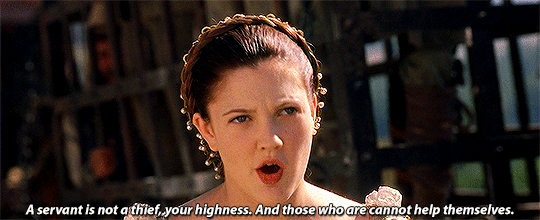
Ever After is a movie I could watch over and over and never fall out of love with. It is one of the most well-done romances ever, and at the same time, you cheer Danielle on for who she is, not just the love she stands to have with Prince Henry. I love the way the story expands on her experiences with abuse, the complex toxicity of her Stepmother (played by the legend Anjelica Huston) and the class politics in France at the time. Yes, it’s one of my favorite love stories that I always sigh longingly for, but it’s so much more than that.
3. Steel Magnolias
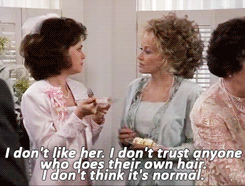
This is one of the movies my Mom and I would watch all the time. I absolutely adore it. It’s heartbreaking, hilarious, clever, and joyful. The speech M’lynn does at the end makes me tear up every damn time. I don’t know very many movies that pull off having so much fun and so much sadness at the same time. Also, you can’t beat the ensemble cast: Dolly Parton, Sally Field, Julia Roberts, Shirley McClain...the list goes on. Just an amazing movie about women, their love for each other and their families, and their resilience.
4. Dirty Dancing
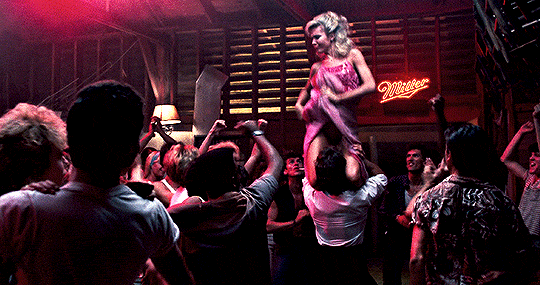
So, this film has a special place in my heart because my late grandmother watched it with me when I was a little girl (much to the chagrin of my Mom, who thought it was too mature for me). Then, when I was older, I would watch it with my best friend Emily and practice dancing in her living room. It was one of my first exposures to women’s sexuality and autonomy and even though it isn’t perfect in its delivery, I really appreciate how the writers cared about those messages. I love the music, I love the aesthetic...it’s just great.
5. The Mummy (+ The Mummy Returns)
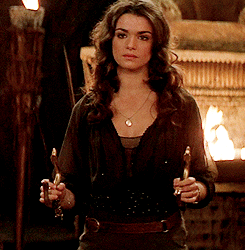
This one is a pretty big no-brainer; it’s probably one of the most widely loved film(s) in the last few decades. You can’t beat it when it comes to combining comedy, drama, historical fantasy, magic, adventure, romance...this one’s got it all. Also Rachel Weisz with both books and sharp weapons was a pivotal inspiration in my queer awakening so, thank you Ms. Weisz. Thank you so much. I might just say I prefer the sequel if only for Evie’s eyebrow evolution.
6. Sabrina (1995)

This version and the 1960s version are both divine when it comes to fashion and aesthetic; both Audrey Hepburn and Julia Ormond take your breath away. I just prefer the 1995 version because it was the first I watched and I love Harrison Ford. Besides that, I’ve always loved the sardonic wit in this movie, and of course the unexpected and endearing romance. It’s a sweet movie for dreaming about one’s life transformed and unexpectedly changed for the better. Also, PEAK slacks-and-shirt fashion here. Peak.
7. Practical Magic
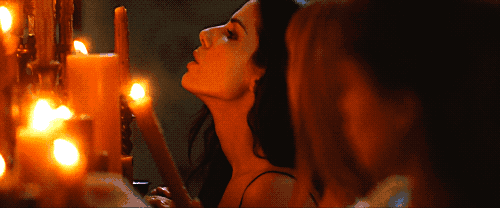
If you haven’t gathered the fact that I’m a big sapphic sucker at this point in the list, well, here you go. Practical Magic is a long-time favorite. Now it is extra bittersweet because as I’ve grown up, my love of it has, too. The relationship between Sally and Gilly mirrors mine and one my best friends as we navigate adulthood. Also, once again, I just love the way women’s lives and complexities are centered. I mean, they literally kill, cast, and defy death for each other. Also, like several others on this list, this cast is A++.
16 notes
·
View notes
Text
my perspective on TJ’s story (as of 3.13)
Over the past few days, I’ve gone back and forth several times about whether to post my response to, yknow, the Gay Angst. OBVIOUSLY I’m heartbroken, as a Tyrus shipper and someone who is deeply invested in their characters as individuals, to see the two of them hurting. But I know this drama is a plot device and that Tyrus, one way or another, will be endgame.
Currently, I am feeling anxious about how much development we will actually get to see for them... but that’s in the future, and I’m trying to focus on the now.
No, there’s some other stuff that made me feel angry and disappointed and honestly, foolish when I first watched the episode.... I wrote out a rant on my phone, and then I added to it later, and now I’m trying to make some sense out of it... now that I’m calmer (but still sad) about it.
This is a pretty long, critical post, so feel free to keep scrollin!
(I reallyjust need to get this out of my system so I can move on.)
I know some people are actually glad that TJ’s storyline is addressing homophobia, but I gotta be honest with yall: I, personally, am not. I’m honestly devastated that this is the route they took, especially since it still seems the gay themes are mostly subtextual.
As of now, there is a LOT of room for interpretation regarding what is going through TJ’s mind and what Kira’s implied threat was actually implying. I don’t interact with children, like, at all... so I really have no idea how much they’d be picking up on.
And I feel kinda uncomfortable with the show using themes of homophobia/the threat of being outed/etc... just to create drama and conflict between characters? Using homophobia as a plot device in this way, without even beginning to deconstruct homophobia, comes off as semi-exploitative to me?? Which is probably because I’m just so tired of Gayngst, which is really my main issue with this storyline...
I am exhausted of the pattern of gay characters struggling with homophobia (internalized or otherwise) and this then causing them to hurt/betray their (gay) love interests.
Being gay and having relationship angst is one thing. But always having angst related to being gay? It is a well-worn trope that I am do not like.
It’s “realistic,” yes, but it’s frequently been done before — hence the TV tropes page on it.
While it is important to portray the affects of homophobia upon LGBT+ and questioning individuals, there must be a balance!
When Gayngst-y representation is the main representation you see, it feels like that’s the ONLY narrative. You are left with the idea that being LGBT+ means you WILL suffer, that you NEED to struggle with your sexuality/gender because that’s how the identity development process is ‘supposed’ to go. And it shouldn’t have to be that way.
(I speak from personal experience)
This is why I’m so passionate about studying LGBT+ media representation. Media informs us of social norms, scripts, expectations; what is acceptable and what is appropriate; how we’re supposed to think and feel and behave. It’s often very subtle, but all of those images and narratives become internalized and affect how you understand yourself, the world around you, and how you fit in to that world.
Media images shouldn’t just reflect society as it is today; it should offer images of a brighter future.
There’s this resonant quote from the musical Hadestown:
“He could make you see how the world could be, in spite of the way that it is.”
And that’s what I so dearly want to see in LGBT+ representation.
It breaks my heart whenever people say things like, “it’s unrealistic for a young gay teen to be comfortable with their identity.” It truly breaks my heart and makes me want to change the narrative.
We should have stories that should how the world CAN be, not just how it often ‘realistically’ is.
I want to see worlds that AREN’T heteronormative, because I’m hopeful for a future in which we truly do dismantle heterosexism.
I want to see queer relationships that go through the “normal” difficulties of dating someone, such as dealing with typical awkwardness and learning to communicate better... instead of dealing with external and internalized homophobia.
Perhaps I’m asking too much, and shouldn’t be this hopeful in 2019, but I will continue to assert the need for joyful, celebratory queer stories that diverge from the trend of queer tragedy.
And I really was hoping that Andi Mack could show this radical possibility that gay people can just be HAPPY sometimes, but.... this is Disney channel.... So I guess I’m not really surprised, but I am still disappointed.
Disappointed not just because I was hoping for an unashamedly gay character, but also because I could see TJ realistically having little conflict over his gayness. (I made a post about this months ago, and I’ll probably be repeating those points now.)
TJ’s concern about how people perceive him has been well-established, re: the dyscalculia storyline. However, I’ve always had an affinity for the concept that because he cares about Cyrus so deeply, he is able to come to terms with his gayness without as much turmoil as one might expect. I think this concept is even more valid after the gun incident, with TJ standing up to his previous friends in order to do the right thing, and admitting that Cyrus is the best thing in his life.
“But ash, this is just you being a hopeless romantic!” you might say. But wait! I have more evidence!
I now realize just how much I was projecting myself onto TJ in regards to his insecurities, and it really had nothing to do with romance:
I have always had this complex duality of “I don’t care what people think!! I gotta be true to myself” and “Oh my god, I care so much and I’m so socially anxious.” (I bet some of you can relate.)
The thing is... while I feel self-conscious about my transness on a near-daily basis... I’ve been pretty unapologetically queer since I realized that I actually had a gay crush.
Granted, I was already a big ‘ally’ with several LGB friends in a fairly liberal area, and this gay awakening was in high school (not middle school). So TJ wouldn’t have all of that going for him.
But my thought processes (regarding my insecurities) has always been:
If people don’t like me for who I am, then they’re not worth my time...
But if people negatively judge me for my abilities? Game over, I’m an insecure mess. THAT’S what I’m most insecure about: seeming dumb or weak or incapable.
And again, maybe this is just self-indulgent projection, but I think this fits TJ, too.
In S2, TJ clearly is so insecure because he thinks he’s stupid since he struggles with math. And since he’s a jock, perhaps at first he can play off his bad grades with the whole “Oh, I’m a athlete, and getting good grades is for nerds, and I’m cooool” (or whatever rhetoric is used nowadays but middle school boys). BUT having a learning disability is far scarier, because it solidifies (in HIS mind) that there is something inherently wrong with his brain.
I could go on and on, analyzing TJ’s inner psyche, but the point is:
I could see him being insecure about his physical and mental skills such as basketball and math, yet being self-assured of his sexuality.
This would also be a realistic option for his character — in my opinion at least, because my own life experiences align well with this interpretation, and well, that’s gotta count for something because I’m pretty sure I’m a real person, even if my experiences aren’t widely shared?
TLDR; The way that they ended taking TJ’s character is a “realistic” option, but it’s not the option that I would’ve chose — both for personal reasons (personally relating to TJ, and wanting to see Tyrus be happy) AND social reasons (believing that children should be able to see a character who isn’t show to struggle with self-acceptance, especially since we already saw Cyrus be scared of himself for being gay).
This isn’t to take away the validity of anyone who DOES relate to/support TJ’s current arc! This is me just sharing my own perspective (and trying to get the sad feelings out of my system).
My whole approach to media representation is challenging the “good representation” vs “bad representation” binary, because doing so is incredibly counterproductive and oversimplified. Instead, we should be constantly asking “What is the context for this representation? What is valuable about it? What are it’s flaws? How could be possibly do better in the future?” So I can see advantages of this particular storyline, but I also have some criticisms that I believe to be substantiated.
#not even gonna tag bc i feel p vulnerable about sharing this#but i needed to release it into the universe so all this stops swirling in my head#and i do feel better having written it out and sending it away
26 notes
·
View notes
Text
Also mannn this is making me remember the old oc i made out of spite for Excellus being a horrible transphobic stereotype in Fire Emblem Awakening. Like "man why do they keep insulting this horrid lil gremlin on his gender non-conforming behaviour and not on the million people he killed?" You know you fucked up when you make me feel sympathy for a dude i absolutely hate! Seriously i couldnt bring myself to even be angry when he killed a protahonist's brother, after hours of really deep-cutting transphobic shit from the heroes i kinda felt like Excellus was justified in stabbing somebody...
So yeh because of that i had the idea that wow that plot could be really effective at making a character sympathetic! What if we had a villain who was transgender but instead of that being something 'scary' about them, its the proof that she's not really evil, and the reason we need to save her? What if she's trapped within an abusive situation from the other members of the villain team, and they're the ones being transphobic while the actual heroes actually act fuckin heroic? What if by switching sides she finds a new home where she can be herself?
And then i kinda developed it quite a lot and designed this cool older lady named Chiffon who had a fancy jewelry-style prosthetic gauntlet for a disabled arm. Like those special rings i saw advertized once that help hold finger joints in a splint for people who have that condition that weakens the tendons? I wish i could remember the name of the disability so i could find that post again. Anyway i thought it would be cool to design a strange magical robot arm based on that aesthetic and then i coukd be like 'hey its based on a real treatment for this different disability!' and then point people at the link IF ONLY I COULD FIND THE LINK AGAAAAAINNN
And her personalitu was TOTES gonna be the science nyeeheehee sass grump person!! But not actually a scientist, instead an alchemist because fantasy! And she would be a badass soldier with elegant fencing style and plant magic that summons roses and stuff. Cos i also wanted to take the opportunitu to play with all the cliches of queer coding in villains, and the 'rose man' is a weirdly common archetype of 'lol please be disgusted because gay but also he is not gay' type nonsense. So yeah here have a proud elderly trans woman in the same role, and also no negative jokes this time. Or ever. Ever again.
And then i was thinking about how she would have ended up working for villains in the first place, and i got tjis really sad story idea where she's in an abusive relationship with her boss. Like she sees him as the first person who ever showed her kindness and keeps excusing whenever he hurts her because he rescued her way back then. And he keeps thier relationship a secret and treats her like shit in public but then tries to pretend like it never happened. And he keeps invalidating her and its clear he sees her as a man and only thinks 'ha if i keep humouring this deluded freak then i'll have a mindlessly obedient attack dog'. And she even overhears him talking about how disgusted he is when he has to fake affection to her in order to get what he wants. But she still keeps going back to him because she feels like she has nowhere else to go. And the heroes would be able to save her by showing her what genuine acceptance really is, and that there is indeed hope of a better life! She's not dependant on this fuck because he's 'the best you'll ever get' and 'the only one who'll ever love you'!
And then big ol hugs and climactic destruction of abuse boyfriend dude and lots of relateable trans experiences and joyful affirmation of your true self! And i hadnt thougjt of a good idea for them yet, but i did wanna have her find an actual genuine lover who would love her for who she is. Like.. 'you can be happy without love' is a perfectly fine moral for other situations, but when her whole plot revolves around an abuser telling her she's unloveable it would indeed be the best possible ending if she has a happy marriage. And also possibly adopts the protagonist and everythibg is joy forever!
So yeh anyway lol that was an idea i had once. But i actually wasnt sure of any story to put her in, lol! I keep bringing her back whenever i invent a new story, but my latest one already has three trans women and one science grump gramp so she might be overshadowed by similar plots?
3 notes
·
View notes
Text
Love is Pain
This week’s topic is Love and Society: Gender. We watched Pariah (Rees - 2011). To accompany the film, we read Martha Nussbaum’s “Love and the Individual: Romantic Rightness and Platonic Aspiration” and Aliyyah I. Abdur-Rahman’s “Black Aesthetic.” In “Love and the Individual,” Nussbaum contemplates whether love is a non-repeatable specific experience (romantic view), or an experience rooted in a set of repeatable qualities in a person (platonic view). On the other hand, Abdur-Rahman argues that “the black aesthetic” is in the “churning overlap of catastrophe and ecstasy” of the black queer experience.
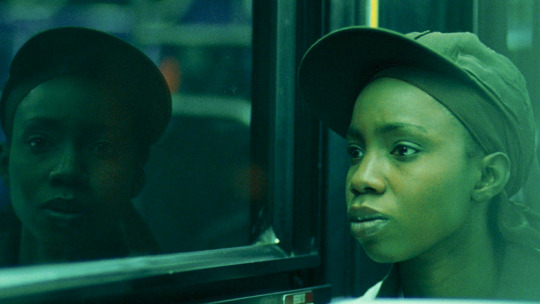
The film and the two readings have one thing in common: their messages on love are based around the notion of pain. Pariah tells the story of a black lesbian teen named Alike, who struggles to come out to her family while balancing her sexual awakening. At the end, Alike is both wiser from her experiences with queer women and pained by her mother’s inability to accept her. Similarly, Nussbaum argues the notion of romantic love vs. platonic love due to the pain she feels from losing who she believed was the love of her life. Abdur-Rahman exemplifies films such as Moonlight to demonstrate how the most painful lives can have joyful moments of love and romance.
It’s interesting to have watched Call Me By Your Name and Pariah in consecutive weeks. While both are in the LGBTQ coming-of-age subgenre, CMBYN actively removes the external sources of pain that come with “growing up gay,” and Pariah fully embraces it. While CMBYN does not have an embodied antagonist, Pariah has one in the deeply conservative, christian mother, Audrey. In some ways, CMBYN is the anomaly, whereas Pariah is the typical experience of the queer individual. Both films express that queer identity is an experience highly dictated by the support (or lack thereof) of the family. Whether the queer teen experience is painful or not, is dependent on the family’s reaction to their queerness. Both films seem to say that in order for the queer individual to love successfully, they must be loved by their family first.
So what is the relationship between the queer experience and parental love? For one thing, it is up to their parents’ attitude on queerness that determines the queer teen’s acceptance or rejection of their queerness. Even more surprisingly, the queer teen often has their first queer experience in a setting that is given to them by their parents: Elio’s first male partner is Oliver, who is his father’s summer intern, while Alike’s first female partner Bina is her mother’s coworker’s daughter. This is to say that parents play an active role in the child’s queer awakening, whether the parents themselves realize their influence or not. So, the parents’ attitude when directly faced with their child’s queerness largely doesn’t decide whether they are queer, but it does decide whether they will accept their own queerness.
The following question then becomes, “what leads the family to accept or reject its child’s queerness?” Abdur-Rahman’s analysis of pain and ecstasy’s coexistence in the Black aesthetic can help. In her article, Abdur-Rahman analyzes Moonlight’s tendency to show “family you choose” over “family you are given.” She states, “Theresa and Juan establish as surrogate parents for Chiron reflects the alternative filial structures of both black and queer families” (350). Similarly, Pariah’s Alike chooses to spend a majority of her time with Laura, her openly gay best friend. While both Chiron’s friendship with Theresa an Juan and Alike’s friendship with Laura bring the queer teen joy, both resort to these non-biological family relationships because of the lack of support from their biological ones: In Moonlight, Chiron’s mother Paula becomes addicted to crack cocaine and thus becomes increasingly unequipped to raise feminine and timid Chiron. Alike’s mother Audrey holds onto stringent, outdated ideas of womanhood that causes her marriage as well as her motherhood to fail. When looking at Paula or Audrey as an individual, each character is damaged by society due to their blackness and womanhood, and thus lack the love it takes to embrace her child’s queerness. In short, Moonlight and Pariah each remarks that it takes a parent who is raised with love to raise her queer child with love.
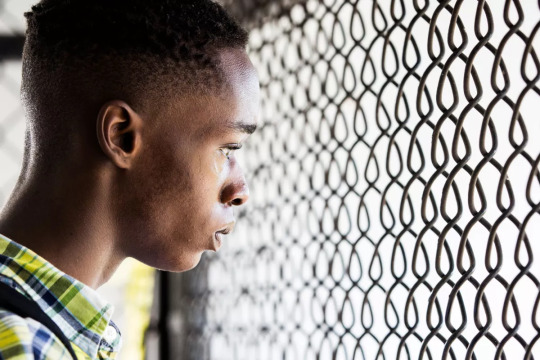
If the queer teen resorts to support from “family they choose,” is that support sufficient? Not necessarily; Juan and Theresa’s love doesn’t stop Chiron from becoming violent at school, a series of events that causes him to start a new life in a different town - Atlanta - and become a drug dealer himself, like Juan. Despite her confidence in Laura’s love for her, Alike instead chooses to start a new life at Berkeley’s early college program and move away from New York entirely. It may seem confusing at first as to why Chiron and Alike leave behind the love that took them so long to find. Perhaps it is the subconscious awareness of the chosen family’s complicity in the queer teen’s pain. After all, Juan himself is the drug dealer who sells crack to Paula “ and thus facilitates the destruction of Chiron’s fragile family [who] helps raise and save him” (350). On the other hand, Alike is aware that as long as she remains home, she will be caught between Audrey’s insistence on Christian values and femininity, and Laura’s insistence on casual hookups with women at night clubs, though she wants neither. In both films, the protagonist has starts a new life in a new town, hoping to find something they couldn’t at home.
While Chiron and Pariah’s personhoods promise the viewer with each character’s potential to succeed in finding happiness and love, the viewer cannot help but wonder, “what could their families have done differently?” Nussbaum’s argument comes in handy here. While Nussbaum is discussing her notions of love to a “romantic” partner, her conclusions help guide us in coming up with solutions to the problems of parental love for the queer child raised in these two films. Nussbaum states, “[lovers] will come to see one another as wholes, not as composites of essence and accident, so that the non-repeatable will be just as intrinsic to the love as the repeatable” (Nussbaum 331). This is a difficult parallel to make, but be patient with me: For a parent of the queer teen, she may consider things like intelligence and kindness as repeatable qualities in the child, while considering femininity/masculinity and queerness as non-repeatable. It is easy to embrace the repeatable qualities, while difficult to embrace the non-repeatable qualities. But the reason that the parent struggles with the non-repeatable qualities of the child that makes them different, is because she sees in the child, an extension of herself. In order to love the queer teen and for the queer teen to love her back, the parent must first be confident in herself as a whole being. Only then can she see the child as a whole being, and embrace the queer teen in all their repeatable and non-repeatable qualities.
0 notes
Text
SPOTLIGHT FILMS: 22 OF THE BEST FILMS AT THE 2019 OUTSHINE FILM FESTIVAL FORT LAUDERDALE EDITION
Photos and film synopses provided by OUTshine Film Festival
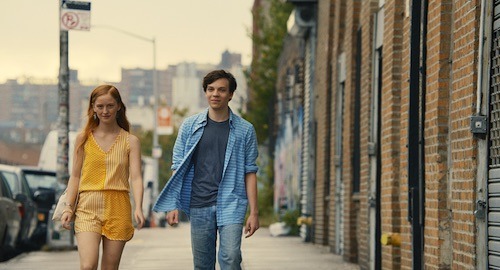
ADAM
(U.S., 2019)
Director: Rhys Ernst
In English
It's 2006 and awkward, self-conscious Adam Freeman has just finished his junior year of high school. His cool older sister Casey (Margaret Qualley) suggests he visit her in New York for the summer. Casey has enthusiastically embraced life amidst Brooklyn's young LGBTQ+ community and invites Adam to tag along with her to queer bars, marriage equality rallies and other happenings. When Adam falls at first sight for Gillian, a smart, beautiful young woman in this new crowd, she mistakenly assumes he is trans. Flummoxed and enamored, he haplessly goes along with her assumption, resulting in an increasingly complex comedy – and tragedy – of errors he's ill-equipped to navigate.

AND THEN WE DANCED
(Georgia, Sweden, France, 2019)
Director: Levan Akin
In Georgian, with English subtitles
Merab is a talented dancer. His burgeoning romance with stage partner Mary is thrown into disarray by the arrival of the magnetic Irakli, leading to a forbidden sexual attraction that recalls those in Moonlight and God's Own Country. Georgia is a country that only celebrated its first LGBTQ+ pride event seven years ago and its society remains conservative. Because of this, And Then We Danced has stirred controversy and many involved remain anonymous out of fear. Amid the potential for socially explosive fireworks, Swedish director of Georgian heritage Levan Akin has captured something uniquely tender and personal.
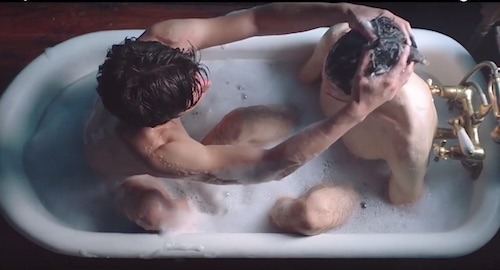
BENJAMIN
(UK, 2019)
Director: Simon Amstell
In English
In Simon Amstell's affecting, bittersweet comedy, a rising young filmmaker is thrown into emotional turmoil by a burgeoning romance and the upcoming premiere of his second feature. It's perhaps no surprise that the imminent release of Benjamin's sophomore feature plunges him into an existential crisis. In this heightened state of insecurity, even meeting his potential dream match, young French musician Noah, doesn't soothe Benjamin's fears and self-loathing. And that's before he has to screen his film to the merciless film festival audiences. Benjamin is a low-key, intimate film, exposing the contradictions of a creative culture while perfectly balancing drama and comedy.
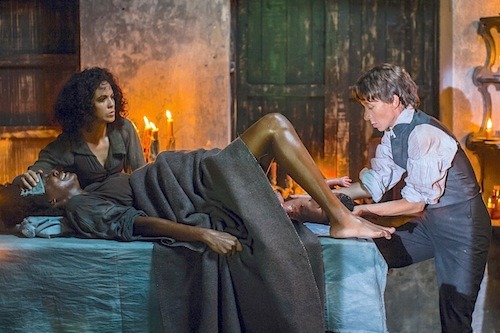
DEFIANT SOULS
(Cuba, Switzerland, 2018)
Director: Fernando Pérez
and Laura Cazador
In Spanish, with English subtitles
Defiant Souls is based on the true story of a woman who, disguised as a man, became the first female surgeon in Latin America. In the early 19th century, Swiss doctor Enrique Faber (Sylvie Testud at her best) travels to Cuba to search for his son, who is said to have been killed in a slave uprising. The local population is jealous of Faber's success as a surgeon and his marriage to Juana, an attractive outsider. Before long, rumors spread regarding his high-pitched voice and his gentle features, and a drama of epic proportions unfolds around one of the most scandalous cases in Cuban colonial history.

EVERYBODY CHANGES
(Panama, 2019)
Director: Arturo Montenegro
In Spanish, with English subtitles
The Ponce Family is the perfect family. They live in the quiet, close-knit mountain town of Bambito, where everyone knows everyone and, unfortunately, everyone knows everyone's business. Frederico is the successful father, Carol the loving mother, and they have three wonderful boys. Despite appearances, perfect might not be the best way to describe the family as Frederico and Carol share a secret: Lizzie, the woman that Frederico has always wanted - no, needed - to be.
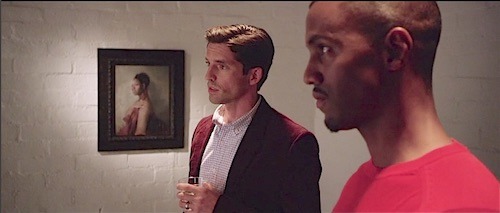
FROM ZERO TO I LOVE YOU
(U.S., 2019)
Director: Doug Spearman
In English
Pete Logsdon is just a guy in Philadelphia whose fear of intimacy creates his history of getting involved with married men. His father and his soon-to-be step-mother are on him to settle down and find someone who's actually available. Instead, he finds a man named Jack who is fifteen years into a perfect marriage, has two beautiful children and an enviable wife, and is firmly inside the closet. Could this be the one? Featuring strong chemistry between the leads, director Doug Spearman (Noah's Arc) creates authentic characters in this highly engaging, obstacle-filled romantic comedy.
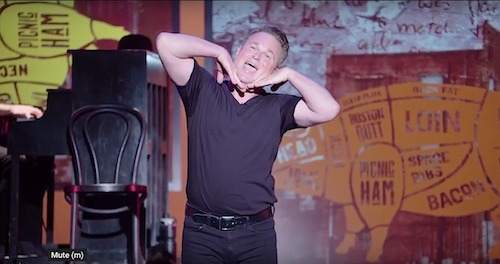
HAM: A MUSICAL MEMOIR
(U.S., 2019)
Director: Andrew Putschoegl
In English
In this dazzlingly filmed live performance of Sam Harris' award-winning one-man musical, Harris belts out original songs and beloved ballads while playing 11 different roles to tell his own life story - from growing up gay in Oklahoma's Bible Belt to his escape for Los Angeles, where his rendition of "Over the Rainbow" on Star Search led to fame, Broadway, television, platinum records and Carnegie Hall. But after the highs and lows of a life in show business, Sam ultimately learns to ask: when is enough finally enough?
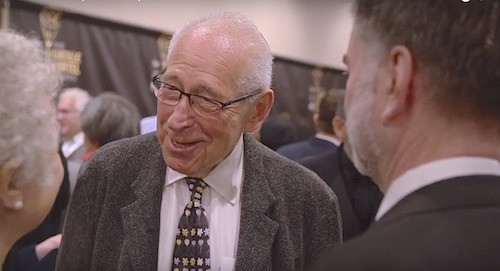
LEONARD SOLOWAY'S BROADWAY
(U.S., 2019)
Director: Jeff Wolk
In English
Through verité documentary footage, humorous storytelling, interviews and archival film material, Leonard Soloway's Broadway captures a Broadway few ever see as told through the eyes of a legendary Broadway producer you've probably never heard of. He lives an unconventional life on his own terms and, over a 70-year span, staged over 100 shows (and counting) which generated history making headlines, over 40 Tony Awards, 62 Tony Nominations, 21 Drama Desk Awards, 29 Drama Desk nominations and 3 Pulitzer Prizes, in addition to launching the careers of famous stars known the world over.
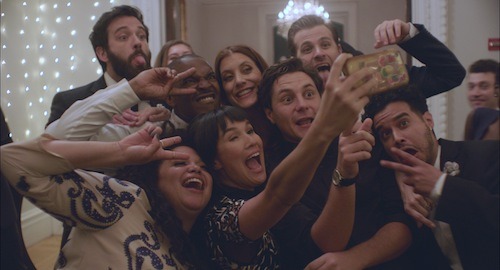
SELL BY
(U.S., 2019)
Director: Mike Doyle
In English
Does every relationship have an expiration date? Adam and Marklin are about to find out. Their 5-year relationship has gone from a passionate flame to a medium burn, forcing them to reconcile with each other's shortcomings all while watching their support network crumble around them. But in this mess, hope springs eternal as they all muddle their way through to try and make life work. Featuring Scott Evans, Augustus Prew, Kate Walsh, and Academy Award nominee Patricia Clarkson, Sell By asks the timeless questions… how do you know who's right for you and how do you know when to let go?

SONG LANG
(Vietnam, 2018)
Director: Leon Le
In Vietnamese, with English subtitles
An unlikely bond develops between hunky, brooding and tough debt collector Dung and Linh Phung, a charismatic young opera singer from a struggling Cai-luong troupe (traditional Vietnamese opera). The two meet when Dung comes to forcefully collect a debt from the opera troupe, but when their paths cross again, a friendship – and then more – develops, awakening surprising, tender feelings in both men. Their story, too, soon scales operatic heights. Director Leon Le has delivered a rich drama, a smoldering relationship between two apparent opposites set against the backdrop of a gorgeous, fading art form. Set in 1980s Saigon, Song Lang is a gritty underworld noir hiding a tender, romantic heart.

STRAIGHT UP
(U.S., 2019)
Director: James Sweeney
In English
The path to relationship bliss is often filled with self-doubt, second guessing and other methods of self-sabotage, but Todd takes this to a whole new level. After all, he is questioning his sexuality… not a good start when forging a new relationship. Todd might be gay. Rory might not care. The result is a neat, romantic-comedy drama with a twist; this is a love story without the thrill of copulation. With wit, humor and poignant moments, coupled with some of the best rapid-fire one-liners in a movie, Straight Up is a feature film about intellectual soul mates.
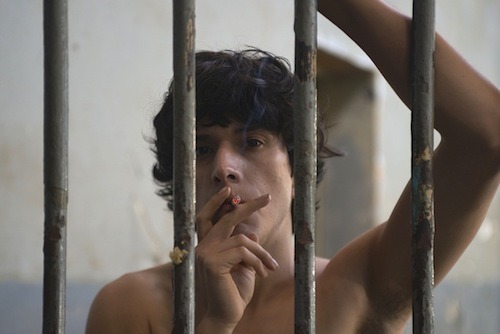
THE PRINCE
(Chile, Argentina, Belgium, 2019)
Director: Sebastián Muñoz
In Spanish, with English subtitles
Chile, 1970. During a night of heavy drinking, Jaime, a lonely 20-year-old young man, stabs his best friend in what seems a crime of passion. Sentenced to prison, he meets The Stallion, an older and respected man in whom he finds protection and from whom he learns about love and loyalty. Behind bars, Jaime becomes known as The Prince. But as their relationship grows stronger, The Stallion faces the violent power struggles within the prison. The Prince is brutal, raw and cold, yet also beautiful, sincere and honest.

THE SHINY SHRIMPS
(France, 2019)
Director: Maxime Govare
and Cédric Le Gallo
In French, with English subtitles
Matthias, an Olympic swimming champion at the end of his career, makes a homophobic statement on TV. His punishment: coach the Shiny Shrimps, a very flamboyant, very bad and very LGBTQ water polo team. They have only one thing in mind: to qualify for the Gay Games in Croatia where the hottest international LGBTQ athletes will compete. It's the start of a bumpy and joyful ride. If the Bad News Bears were a water polo team, and LGBTQ, they would be The Shiny Shrimps. Faster, higher, stronger… and fabulous.

UNSETTLED: SEEKING REFUGE IN AMERICA
(U.S., 2019)
Director: Tom Shepard
In English
A remarkable look at the untold stories of LGBTQ+ refugees and asylum seekers who have fled intense persecution from their home countries and who are resettling in the U.S. The film follows four new arrivals, each of whom have escaped potential peril in their native countries for being different. They've landed in the purported "gay mecca" of San Francisco, yet even there, building a new life in an adopted nation is a precarious undertaking. As new leadership in America continues to restrict immigrants and drastically cuts the flow of refugees and asylum seekers, Unsettled: Seeking Refuge in America humanizes a group about which few people know.
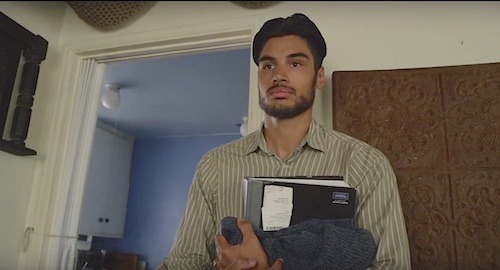
WHERE WE GO FROM HERE
(U.S., 2018)
Director: Anthony Meindl
In English, French, with English subtitles
In Binghamton, an ESL teacher dealing with domestic abuse finds even greater violence at her school. In Orlando, two lovers drifting apart may be separated by the hate of another. In Paris, friends on an introspective night out are caught up in a brutal madness. Three acts of terror disrupt the lives of ordinary people. Will love win out over violence? With gripping performances and storylines all too familiar and frightening, Where We Go From Here is not an easy film to digest nor is it a question easily answered, but both are ultimately worth the effort.

MEN'S SHORTS
Black Hat
Director: Sarah Smith, U.S., 15 minutes
Softer
Director: Lovell Holder, U.S., 10 minutes
The Proposal
Director: Gerlando Infuso, France, 15 minutes
Thrive
Director: JamieDi Spirito, UK, 17 minutes
Touchscreen
Director: Arthur Halpern, U.S., 15 minutes
Vacaciones
Director: Juan Olivares, Spain, 21 minutes
Wonder
Director: Javier Molina, U.S., 16 minutes
This was originally published in Wire Magazine Issue 20.2019
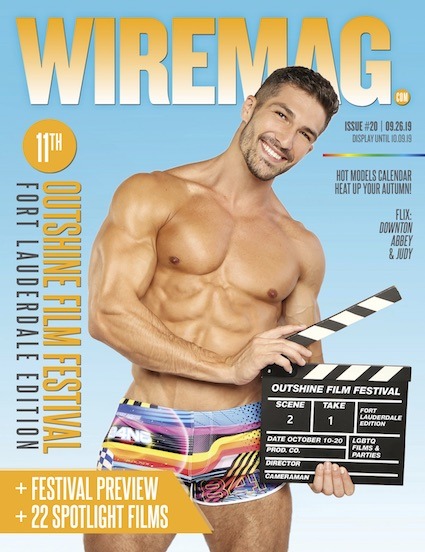
#wire magazine#wiremag.com#wire#miami#miami beach#south beach#sobe#fort lauderdale#wynwood#wilton manors#gay#lgbt#glbt#outshine film festival fort lauderdale#outshine#outshine film festival#spotlights#films
1 note
·
View note
Text
Personality Crisis: The Radical Fluidity of Todd Haynes’ ‘Velvet Goldmine’ by Judy Berman
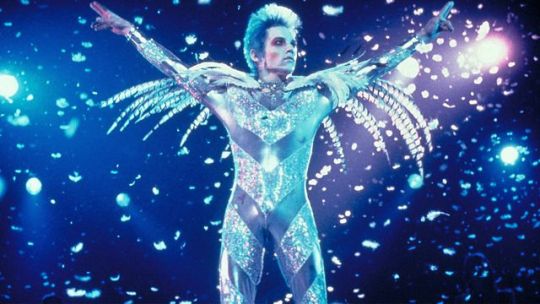
[This month, Musings pays homage to Produced and Abandoned: The Best Films You’ve Never Seen, a review anthology from the National Society of Film Critics that championed studio orphans from the ‘70s and ‘80s. In the days before the Internet, young cinephiles like myself relied on reference books and anthologies to lead us to film we might not have discovered otherwise. Released in 1990, Produced and Abandoned was a foundational piece of work, introducing me to such wonders as Cutter’s Way, Lost in America, High Tide, Choose Me, Housekeeping, and Fat City. (You can find the full list of entries here.) Over the next four weeks, Musings will offer its own selection of tarnished gems, in the hope they’ll get a second look. Or, more likely, a first. —Scott Tobias, editor.]
Like the glam rockers it gazes upon through the smoke-clouded lens of memory, Velvet Goldmine is most beautiful when it descends into chaos.
Stolen, the way great artists do, from Citizen Kane, the skeleton of Todd Haynes’ 1998 film is a chain of interlocking reminiscences of Brian Slade (Jonathan Rhys Meyers), a David Bowie-like glam rocker who fakes his own onstage death in the mid-’70s. A decade later—in that most dystopic of years, 1984—his ex-wife Mandy (Toni Collette) and former manager Cecil (Michael Feast) relate their bitter tales of betrayal to a journalist (Christian Bale) whose assignment has him reluctantly reliving his own teenage sexual awakening under the influence of Brian’s music. Between the interviews, musical numbers, and onscreen epigrams, there’s also a mysterious female narrator who sometimes surfaces, like a teacher reading a subversive storybook, with dreamy exposition that reaches back a century to invoke glam’s patron saint, Oscar Wilde.
The film climaxes with a propulsive sequence of scenes that are exhilarating precisely because they merge all of these points of view, subjective and omniscient, into one collective fantasy. Brian and his new conquest, the Iggy Pop/Lou Reed composite Curt Wild (Ewan McGregor), ride mini spaceships at a carnival to Reed’s “Satellite of Love.” Two random schoolgirls, their faces obscured, act out a love scene between a Curt doll and a Brian doll. In a posh hotel lobby, Brian’s entourage, styled like Old Hollywood starlets on the Weimar Germany set of a fin-de-siècle period film, recites pilfered sound bites about art. Then Brian and Curt are kissing on a circus stage, surrounded by old men in suits. They play Brian Eno’s “Baby’s on Fire” as Haynes cuts between the performance, an orgy in their hotel suite, and Bale’s hapless, young Arthur Stuart masturbating over a newspaper photo of Brian fellating Curt’s guitar. Stripped of narration—not to mention narrative—the film seems to be running on its own amorous fumes, its story fragmenting into a heap of glittering images as it hurtles from set piece to set piece.
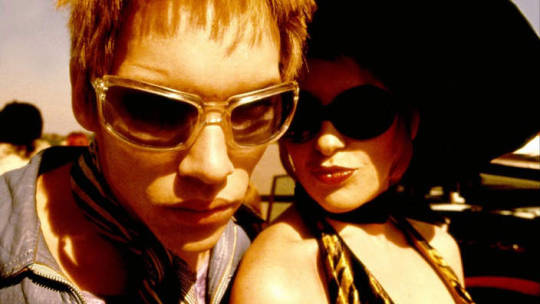
Visual pleasure aside, it’s a perfect way of translating into cinematic language the argument that underlies Haynes’ script—that glam’s revelations about the radical fluidity of human identity go far beyond sex and gender. As the apotheosis of teen pop audiences’ thirst for outsize personae, fictional characters like Ziggy Stardust (who Velvet Goldmine further fictionalizes as Slade’s alter ego, Maxwell Demon) melded the symbiotic identities of artist and fan into a single, tantalizing vision of hedonism and transgression. Kids imitated idols they didn’t quite recognize as pure manifestations of their own inchoate desires. Musician and fan became each other’s mirror, and both could become entirely new people simply by changing costumes or names.
But it’s pretty much impossible to imagine Velvet Goldmine’s distributor and co-producer, Harvey Weinstein, appreciating this as he watched the film for the first time—or seeing anything in it, really, besides an expensive mess.
Haynes and his loyal producing partner, Killer Films head Christine Vachon, had already been through hell with Velvet Goldmine by the time they delivered a cut to Miramax. Bowie had refused Haynes’ repeated requests for permission to use six Ziggy-era songs in the film, claiming that he had a glam movie of his own in the works. And in a production diary that appears in her book Shooting to Kill, Vachon points out one unique challenge of making a film about queer male sexuality: “The MPAA seems to have a number of double standards. Naked females get R ratings, but pickle shots tend to get NC-17s. Our Miramax contract obligates us to an R.” She also mentions that an investor pulled $1 million of funding just weeks before filming.
The shoot was even more harrowing than the two veteran indie filmmakers could’ve predicted. As they fell behind schedule, a production executive started nagging Vachon to make cuts. “Todd is miserable,” she wrote in her diary the night before they wrapped. “He says that making movies this way is awful and he doesn’t want to do it.” In an interview that accompanies the published screenplay for Velvet Goldmine, Oren Moverman asks Haynes, “Was the making of the film joyful for you?” “I’m afraid not,” he replies. “We were trying very hard to cut scenes while shooting, knowing that we were behind and we didn’t have the money for the overloaded schedule. But there was hardly a scene we could cut without losing essential narrative information.” It’s remarkable that he managed to capture 123 usable minutes’ worth of meticulously art-directed ‘70s excess (and ‘80s bleakness) in just nine weeks, under so much external pressure, on a budget of $7 million.
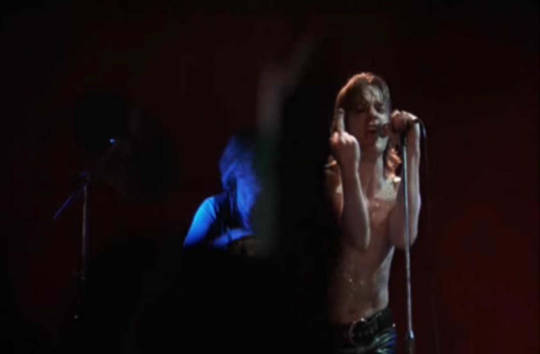
When the film finally reached Harvey Scissorhands, after months of editing, Weinstein told Haynes it was too long and the structure didn’t work. “He made suggestions that I didn’t follow, and then he just buried it,” the director told Down and Dirty Pictures author Peter Biskind. What happened next comes straight from the Weinstein playbook: “Even afterward,” Haynes remembered, “they threw out a DVD, they didn’t ask for a director commentary, my name wasn’t on the cover of it, it was buried in the minuscule billing block. He can’t even do the really small things that don’t cost anything—he never shows any respect.” (That Haynes never found a distributor he preferred to Weinstein, with whom he reunited for I’m Not There and Carol, speaks volumes about the way Hollywood treats ambitious filmmakers.)
After it failed to blow audiences away at the 1998 Cannes Film Festival, Miramax effectively dumped Velvet Goldmine. It debuted on just 85 screens that November, ultimately grossing about $1 million stateside. Its ridiculous theatrical trailer might well be a glimpse at the movie Weinstein was expecting: a “magical trip back to the ‘70s” with 100% more murder mystery and 100% less gay sex.
Critics were just as ambivalent about the film as festival audiences. While forward-thinking reviewers wanted to love it for its visual beauty and openly queer aesthetic, many lamented that its plot was slight and its characters hollow. David Ansen of Newsweek complained that “Haynes is unwilling to get too close to his characters. Slade, in particular, is a blank”—failing to see that Brian is a cypher by design. Like the Barbie-doll Karen Carpenter of Haynes’ debut feature, Superstar, and the fragments of Bob Dylan diffused across I’m Not There, Velvet Goldmine’s Bowie is less a portrait of the real person than a screen on which fans project their own fantasies about him.
At The Nation, Stuart Klawans rightly identified Arthur, not Brian, as the film’s protagonist. But he also wondered why he grows up to be such an unhappy adult. “Why is Haynes so tough on Arthur?” Klawans wanted to know. “Why, through the character, is he so tough on himself? It’s apparent everywhere in Velvet Goldmine that Haynes, like Arthur, loves Glitter Rock. He, too, fell for a mass-marketed product, which was no more likely than Mr. Clean to carry out a world-transforming promise. But instead of honoring the truth of his enthusiasm, so that he might look back on its object with a smile and a sigh…Haynes does penance for being a sap.”
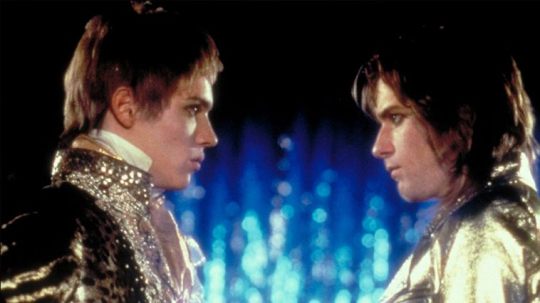
Others found the film’s collage of ideas and allusions cumbersome. “Velvet Goldmine is weighed down with self-important messages, but it’s also splashily opulent,” Stephanie Zacharek wrote at Salon. “It’s as if Todd Haynes had plunged his hand into a pile of clothes at a jumble sale and come out with a handful that was half velvet finery, half polyester rejectables.”
All of these reactions make sense, coming from adult critics who had probably seen the film just once, after reading months’ worth of reports about its troubled birth, in the sterile environment of a press screening. But what’s clear from a distance of nearly two decades, during which Velvet Goldmine has become a low-key cult classic, is that few films are so poorly suited to be judged on the basis of a single dispassionate viewing. If you’re looking for tight plotting and complex characters, you’re not going to find them in this mixtape of music videos, aphorisms, and waking dream sequences. There is no actual murder mystery, and Arthur’s investigation into Slade’s disappearance isn’t a source of suspense so much as an excuse to keep contrasting an incandescent past with a dull, gray present.
I’m lucky enough to have first encountered Velvet Goldmine under what turned out to be ideal circumstances: at age 15, on premium cable, late enough at night that it easily bypassed my rational mind en route to my adolescent subconscious. I had no idea how many details it cribbed from the biographies of Bowie and his contemporaries, or how much of the dialogue was quoted from their (and their heroes’) most memorable utterances. I bought the soundtrack without realizing that it put ‘70s originals side-by-side with contemporary covers and new songs by younger bands like Pulp and Shudder to Think in yet another glam pastiche. It wouldn’t have occurred to me to find the 1984 scenes unsatisfying because I got so instantly immersed in the ‘70s spectacles that they barely existed for me.
Not that the film only works on an emotional level. Haynes’ ideas about fandom, politics, sexuality, and identity become even more profound once you can see the organizing principle behind what might initially seem like a jumble of indulgent images. Like the death hoax Brian Slade uses to escape a fantasy life that’s grown too real for comfort, Velvet Goldmine’s loose plot is classic misdirection, obscuring a tight and purposeful structure that delays the resolution of the ‘80s storyline until it’s primed you to feel the loss of the liberated ‘70s viscerally. But you’ll never get that far into dissecting the film if you don’t fall in love with it at first viewing. And that’s easiest to do when you’re as impressionable as young Arthur, who watches Brian Slade flaunt his queerness in a televised press conference and imagines himself shouting to his parents, “That is me!”
Revisit it as you grow older, though, and you might discover that the disillusioned 30-something characters now feel as rich as their idealistic former selves. Velvet Goldmine is often called a gay film, but that obscures the universal resonance of its queer coming-of-age narrative. Better to think of it as a bisexual film that uses non-binary sexuality as a metaphor for the boundless possibilities of youth—the promise of a future constrained only by the limits of one’s own ambitions and appetites. Its characters can’t achieve permanent liberation by “coming out”; to maintain lifestyles that match their desires, they would have to reject the monogamy that defines adulthood for most people. Particularly amid the AIDS crisis of the 1980s, which haunts the film’s dreary present on a purely subtextual level, it’s obvious why they (like the real glam rockers they’re modeled after) retreat from the liberated lives they staked out for themselves.
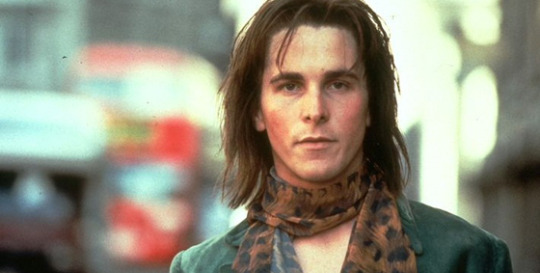
But you don’t need to buy in to the incendiary claim Brian makes at his press conference, that everyone is bisexual, to see how this storyline reflects the many kinds of disappointments that await most starry-eyed fans in adulthood. Klawans’ objection to Haynes’ treatment of Arthur feels naive because it assumes people should be able to peacefully coexist with their shattered dreams. Why shouldn’t he feel bitter about having joined a sexual revolution that didn’t, finally, set him free? “It gets better” for Arthur when he leaves his homophobic family to move in with a latter-day glam act in London, but sometime after he hooks up with an unmoored Curt Wild at a tribute concert called the Death of Glitter, “it” just gets boring as the world gets worse.
And the world really does sometimes get worse, though audiences in the relatively peaceful, prosperous late ‘90s might have forgotten about that. Watching Velvet Goldmine for perhaps the 25th time, two weeks before Donald Trump’s inauguration, at the end of an era that has brought unprecedented freedom of sexual and gender expression, I was struck by how vividly Haynes captures a culture’s flight from progress, and how rare it is to see that kind of transition depicted on film. His argument about fluidity turns out to be even more potent when applied to societies than individuals (or, at least, it seems that way in 2017). Our capacity for transformation may be infinite, but that doesn’t mean those changes are always for the best.
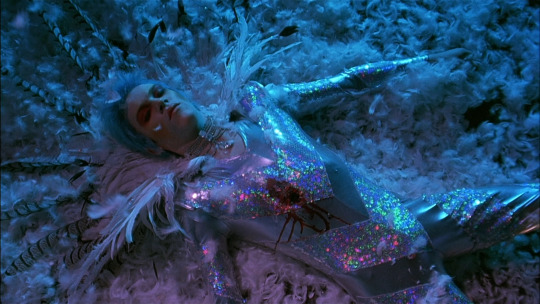
#todd haynes#velvet goldmine#ewan mcgregor#christian bale#jonathan rhys meyers#toni collette#michael feast#citizen kane#produced and abandoned#David Bowie#lou reed#oscar wilde#killer films#christine vachon#Musings#Oscilloscope Laboratories
14 notes
·
View notes
Text
December 9th Christmas Devotional
Jeremiah 23:6
In his days Judah shall be saved, and Israel shall dwell safely: and this is his name whereby he shall be called, The Lord Our Righteousness.
While Shepherds Watched Their Flocks
While shepherds watched their flocks by night, All seated on the ground, The angel of the Lord came down, And glory shone around. "Fear not," said he, for mighty dread Had seized their troubled minds; "Glad tidings of great joy I bring To you and all mankind.
"To you, in David's town, this day, Is born of David's line A Savior, who is Christ the Lord; And this shall be the sign. The heavenly Babe you there shall find To human view displayed, All meanly wrapped in swaddling-clothes nd in a manger laid."
Thus spake the seraph and forthwith Appeared a shining throng Of angels, praising God, and thus Addressed their joyful song: "All glory be to God on high, And to the earth be peace; Good will henceforth from Heaven to men Begin and never cease."
Christmas Day in the Morning
Pearl S. Buck
He woke up suddenly and completely! It was four o’clock, the hour at which his father had always called him to get up and help with the milking. Strange how the habits of his youth clung to him still! Fifty years ago, and his father had been dead for thirty years, and yet he waked at four o’clock in the morning. He had trained himself to turn over and go to sleep, but this morning it was Christmas, he did not try to sleep.
Why did he feel so awake tonight? He slipped back in time, as he did so easily nowadays. He was fifteen years old and still on his father’s farm. He love his father. He had not know it until one day a few days before Christmas, when he had overheard what his father was saying to his mother.
“Mary, I hate to call Rob in the mornings. He’s growing so fast and he needs his sleep. If you could just see how he sleeps when I go in to wake him up! I wish I could manage alone.”
“Well, you can’t, Adam.” His mother’s voice was brisk, “Besides, he isn’t’ a child anymore. It’s time he took his turn.”
“Yes,” his father said slowly. “But I sure do hate to wake him.”
When he heard these words, something in him woke: his father loved him! He had never thought of it before, taking for granted the tie of their blood. Neither his father nor his mother talked about loving their children–they had no time for such things. There was always so much to do on the farm.
Now that he knew his father loved him, there would be no loitering in the mornings and having to be called again. He got up after that, stumbling blind with sleep, and pulled on his clothes, his eyes tight shut, but he got up.
And then on the night before Christmas, that year when he was fifteen, he lay for a few minutes thinking about the next day. They were poor, and most of the excitement was in the turkey they had raised themselves and the mince pies his mother made. His sister sewed presents and his mother and father always bought something he needed, not only a warm jacket, maybe, but something more, such as a book. And he saved and bought them each something, too.
He wished, that Christmas he was fifteen, he had a better present for his father. As usual he had gone to the ten-cent store and bought a tie. It had seemed nice enough until he lay thinking the night before Christmas. He looked out of his attic window, the stars were bright.
“Dad,” he had once asked when he was a little boy, “what is a stable?”
“It’s just a barn,” his father had replied, “like ours.”
Then Jesus had been born in a barn, and to a barn the shepherds had come…
The thought struck him like a silver dagger. Why should he not give his father a special gift too, out there in the barn? He could get up early, earlier than four o’clock and he could creep into the barn and get all the milking done. He’d do it alone, milk and clean up, and then when his father went in to start the milking he’d see it all done. And he would know who had done it. He laughed to himself as he gazed at the stars. It was what he would do, and he mustn’t sleep too soundly.
He must have awakened twenty times, scratching a match each time to look at his old watch–midnight, and half past one, and then two o’clock.
At a quarter to three he got up and put on his clothes. He crept downstairs, careful of the creaky boards, and let himself out. The cows looked at him, sleepy and surprised. It was early for them, too.
He had never milked all alone before, but it seemed almost easy. He kept thinking about his father’s surprise. His father would come in and get him, saying that he would get things started while Rob was getting dressed. He’d go to the barn, open the door, and then he’d go to get the two big empty milk cans. But they wouldn’t be waiting or empty; they’d be standing in the milkhouse filled.
“What the—–,” he could hear his father exclaiming.
He smiled and milked steadily, two strong streams rushing into the pail, frothing and fragrant.
The task went more easily than he had ever known it to go before. Milking for once was not a chore. It was something else, a gift to his father who loved him. He finished, the two milk cans were full, and he covered them and closed the milkhouse door carefully, making sure of the latch. Back in his room he had only a minute to pull off his clothes in the darkness and jump into bed, for he heard his father up. He put the covers over his head to silence his quick breathing. The door opened.
“Rob!” His father called. “We have to get up, son, even if it is Christmas.”
“Aw-right,” he said sleepily.
The door closed and he lay still, laughing to himself. In just a few minutes his father would know. His dancing heart was ready to jump from his body. The minutes were endless—ten, fifteen, he did not know how many—then he heard his father’s footsteps again. The door opened and he lay still.
“Rob!”
“Yes, Dad—”
His father was laughing a queer sobbing sort of laugh.
“Thought you’d fool me, did you? His father was standing beside his bed, feeling for him, pulling away the cover.
“It’s for Christmas, Dad!”
He found his father and clutched him in a great hug. He felt his father’s arms go around him. It was dark and they could not see each other’s faces.
“Son, I thank you. Nobody ever did a nicer thing—”
“Oh, Dad, I want you to know–I do want to be good.” The words broke from him of their own will. He did not know what to do. His heart was bursting with love. He got up and pulled on his clothes again and they went down to the Christmas tree. Oh, what a Christmas, and how his heart had nearly burst again with shyness and pride as his father told his mother and made the younger children listen about how he, Rob, had got up all by himself.
“The best Christmas gift I ever had, and I’ll remember it, son, every year on Christmas morning, so long as I live.” They had both remembered it, and now that his father was dead, he remembered it alone: that blessed Christmas dawn when alone with the cows in the barn, he had made his first gift of true love.
This Christmas he wanted to write a card to his wife and tell how much he loved her, it had been a long time since he had really told her, although he loved her in a very special way, much more than he ever had when they were young. He had been fortunate that she loved him. Ah, that was the true joy of life, the ability to love! Love was still alive in him, it still was.
It occurred to him suddenly that it was alive because long ago it had been born in him when he knew his father loved him. That was it: Love alone could awaken love. And he could give the gift again and again. This morning, this blessed Christmas morning, he would give it to his beloved wife. He could write it down in a letter for her to read and keep forever. He went to his desk and began his love letter to his wife: My dearest love…..
Such a happy, happy Christmas!
0 notes
Text
Report Back. Notes from the Gathering
The Allied Media Conference this year brought me back to Detroit. I only visited once in December 2015 to vision a structure for CEPA (then, el Semillero) and sketch a pathway in time to its launch with Adela Nieves. Facilitated by the fabulous adrienne maree brown, we created a deep intentional container for the organization by sharing vulnerabilities. We had hard talks amidst laughter, art and grounding—our relationship to money, our way of relating in moments of crisis vs. at our best, our energies, passions, skills and interests—and used them to establish preliminary guidelines for managing conflict, for resourcing, for assuming roles and identifying gaps in the organization. Even then, these two womyn of color who were early transplants to the city of Detroit, gave me a sense of the deep commitment and clarity that surrounds those who have been part of the movement to wage love in response to crisis.
As a Sponsored Project of Allied Media (webpage coming soon), I’d been wanting to get to the conference—but it wasn’t until Adela herself, alongside Sofia Gallisá and Teresa Basilio, planned a solidarity gathering between Island and Detroit/Diaspora to share experiences and strategies for fighting emergency control that are emergent on the island in the form of a fiscal control board—that I made it back. If you want a summary of topics covered at the day-long encounter, read this. The goal of this entry is to play in the intersection(s) between Puerto Rican gathering and the larger conference. In it, you’ll find reflections of questions I have been carrying around since then related to building CEPA and weaving together a practice-based community-a dreamspace for healing.
Hiding. First Encounter.
I arrive to the airport, buoyant, excited. To my surprise, the waiting area outside the gate is filled with others also enroute to the conference. Immediately, I feel a surge of anxiety—los corillitos son algo famoso de la isla and I briefly feel suffocated. I stay on the edges, connecting with those who aren’t fully a part of this dynamic.
But as we left behind the island geography, the stories and dynamics also loosened. We blend(ed) in our shared devotion and conviction that finding alternative pathways forward in these times meant connecting to the diaspora. I wondered how long it would last. Expecting the worst is one of the tendencies I’m trying to shift.
Repeated failures in accounting for a coherent report-back end with clusters organized around water. It seems prescient. Could there be anything more central to the questions of our survival and collective liberation?
Water is ____
We.
Yasmin opened up the Puerto Rico panel with a poetic inquiry into our status as a people. We (the revolutionary) are and have always been charco crossers. So, too is our work. To touch both multiple places at once. To be fluid, and massive and unifying like the sea. She knows what it is to be broken and wants to take us to another geography, where creating space for expertise in all forms but in her talk, she hints to the continual repair (in NY, my soul was broken. Here in Moca, it’s finally healed. But (now) my body is broke down).
Life.
Monica Lewis Patrick—awakens the fluid parts of me and I cry. I learn of the BOUNTY of the water supply in Detroit—21% of all surface freshwater in US—and later, flint. The switch that left all water in the area affected. The lines themselves contaminated. You can’t just change sources back and boom. The families who create crisis and then are nominated to end it show another part of the cycle. You’ve got to claim that island is your island.
I remember the water dilemma in Puerto Rico. In the coming storm, it’s drought that I fear. Drought of course, will likely accompany shut-offs. The extremes grow every day. Torrential stormy days in June //The kinds that come after your insides, knock things down in the apartment//followed by days so hot everything moving sweats.
I sit with a farmer + filmmaker at a friend’s bday party later and listen to a shocking scenario: Can you imagine a 5-year drought here Meli? What would we do on this island if the rivers dried up? I don’t have the answer. But I yearn to get into a space where I can begin practicing the answer.
Cyclical.
The formula is more or less the same everywhere that capitalism and colonialism have reigned: Red land + black labor = white wealth (TY Antonio for putting it so clearly).
Beyond it, the connections are less visible.
Our collective liberation stories look so different.And that’s nothing new.
Those at the margins, drawing on the life-work and worlds of black feminists, queer subjectivities and poverty are grateful for the diaspora’s clarity.
There is little space in the agenda for real talk.So much to do.
And that’s nothing new.
We have to face each other. Move light years beyond this knot(s) that took 500 + years to tie.
Rebirth.
We can all see it, I realize. We all want to shift it. Change form.
Models are helpful so I am grateful for the inspiration and joy of the self-determination projects we visited across the city.rooted in place.
In unlearning and detangling links
slavery and subsistence.
Past and future (sankofa)
here and there.
As Antonio talked of population decline and to my surprise, I wept. Those who hear my story and look at me strangely when I tell them of my move and ask, “Aren’t you moving in the wrong direction?” Depends on the endpoint, I guess.
A friend sitting beside me hugged me. We had been surviving a tense distance over the small shit. This reminder helped us to compost it. To remember that despite the odds, we had decided to return and that we were here deciding and preparing for another world.
All of this was encapsulated in the joyful convergence of media makers, social justice warriors, creative energy and healing spirits. Where I drew inspiration and contagious love to continue the work of crafting holistic, (r)evolutionary tactics. Decolonizing. You are my other self.
What I found so deeply renewing about the conference was the attention to the things I intend. Tbh, I can feel a little crazy out here in Puerto Rico. To spend days resonating with others committed to healing justice, waging love—focusing on relationships, on somatic practices for the long haul—was a gift I can’t fully express. I also learned techniques for listening to wisdom you weren’t expecting in moments of upset, nightmare or despair. To bringing emotional care to the frontlines of large-scale mobilizations, to writing stories that are also accessible, that center the joy of our practices, facilitating collective self-governance. To becoming my own oracle and casting spells for liberation.
Having returned to the frustration of searching for our pilot, I try to remember what an energetic heart-space can create//How short a time it can take for something wonderful to happen//the importance of intention
For now, I am keeping my eyes on the crossing. Searching for others who have decided to transform and who would work together to rescue and reconstruct fragments from the recesses of the sea. Shifting, translating and becoming.
0 notes
Link
Oh My God! It’s The Church
Postcards is back and bigger than ever! This three-week festival of circus, cabaret and extraordinary performance at Jacksons Lane, North London’s creative space, offers twists, turns and just a touch of blasphemy.
All shows are Pay What You Decide, so audiences can reserve their tickets in advance – totally free – and make a donation of their choice after the performance, either by cash on the door or card at the box office. This is the only London festival where all shows adopt this policy!
All uncollected tickets are released 15 minutes before the performance, so come down, hang out, and take a chance. There’s a pop-up kitchen and a fully-stocked bar featuring craft beer and locally sourced gin. Highlights this year include Two Tongue Theatre’s gender-bending satire, Scandi circus sensation Tanter’s Vixen and Morgan & West’s mind-blowing magic tricks.
Artistic Director, Adrian Berry, comments for our 7th year we are delighted to announce the return of Postcards Festival for 2017. It’s the one time of the year that we really get to mix things up – edgy new cabaret, enticing circus and peep shows around the building, a feast of live art fused with hiphop and gospel – 15 nights of the most fun you could possibly have in our capital – and possibly the only festival where the audience chooses how much to pay. How could you refuse?
The full Postcards 2017 programme is as follows:
Tuesday 11th July – 8pm – The Late Night Shop
Sinister sex appeal, sharp wit and underground vaudeville vibes from the ladies of The Late Night Shop. Adults only.
Wednesday 12th July – 8pm – Boys Club
Some girls will do anything to get on stage. Awaken your inner activist with Two Tongue Theatre’s gender-bending satire on inequality.
Friday 14th July – 8pm – The Cocoa Butter Club Speakeasy
How’s your Friday night looking? A little dry and dusty? A good squirt of warm, thick Cocoa Butter will do the trick. This roster of queer performers of colour are here to moisturise a thirsty club scene with burlesque, voguing, spoken word and more.
Saturday 15th July – 8pm – Oh My God! It’s The Church
It’s time you sinners went back to church. Fusing music, dance, theatre and comedy, Legs Akimbo’s raucous Deep South Pentecostal Church party is brimming with heaven-sent soul, Motown and disco tunes. Hell, even Jesus gets down and dirty at this show!
Monday 17th July – 8pm – Guilty Party
Hocus Pocus Theatre transform Jacksons Lane into Harry’s Place: a theatrical club experience in a den of immersive iniquity. The sleazy proprietor and menagerie of performers turn cabaret on its head, making a song and dance out of the state of the nation.
Tuesday 18th July – 8pm – Parlour Tricks
Join time-travelling magic duo Morgan & West for an evening full of jaw-dropping, brain-bursting, gasp-eliciting feats of magic. Wear a hat – they might just blow your mind.
Wednesday 19th July – 8pm – First Lady
In early 90s Chicago, a man in a dress ran for president. George Orange tells the true story of Joan Jett Blakk, the queer hero who promised to “Lick Bush in ’92!”
Thursday 20th July – 8pm – Vixen
Women, sex and circus: three women throw themselves at female stereotypes with comic timing, contortion and a swinging trapeze. A fanatically female explosion from Scandi sensations Tanter.
Friday 21th July – 8pm – Cypher Stories
Records scratch. B-boys dance. A freestyle cypher begins. A cyr wheel spins by – wait, what? This one-of-a-kind mash-up from Simple Cypher recalls the early days of hip hop with a fresh circus twist. And if you don’t know, now you know.
Saturday 22nd July – 8pm – It Started With Jason Donovan
Sarah Blanc recounts her past dating life through the songs of her first love – Jason Donovan. Heartfelt life lessons delivered through dance, theatre, comedy and a whole lot of lycra.
Tuesday 25th July – 6.30pm and 9pm – The Penguin and I
It’s the morning after the night before and Living Room Circus have a story to tell. Absurd acrobatics, audacious aerials and an obnoxious penguin combine in this explosive, immersive performance.
Wednesday 26th July – 8pm – Rise
Let’s go round again! Against a backdrop of tightwire, live music, theatre and dance, Dizzy O’Dare wanders into a world of romance, surrealism and eternal return. For lovers, voyeurs, and all in between.
Thursday 27th July – 8pm – Stuff
A love story, but not like that. Another kind of love story. Maybe everybody’s love story. Lead clown for Cirque du Soleil Sean Kempton combines comedy, mime, clowning and dance to create a piece that’s playful, funny, sad and familiar.
Friday 28th July – 8pm – Circus Abyssinia
Bibi and Bichu present a joyful celebration of circus: an autobiographical tale of mischief, magic and the Man in the Moon. Daredevil stunts, heart-in-mouth acrobatics, virtuosic juggling and sinuous contortion are performed to an exhilarating Ethiopian soundtrack.
Saturday 29th July – 8pm – Shhh! Cabaret
Acclaimed circus blogger Lucy Loves Circus returns to Postcards with a specially-curated night of spectacle and surprise. From burlesque to boxing: expect nothing but the unexpected from this festival finale.
http://ift.tt/2pGJE0Z LondonTheatre1.com
0 notes